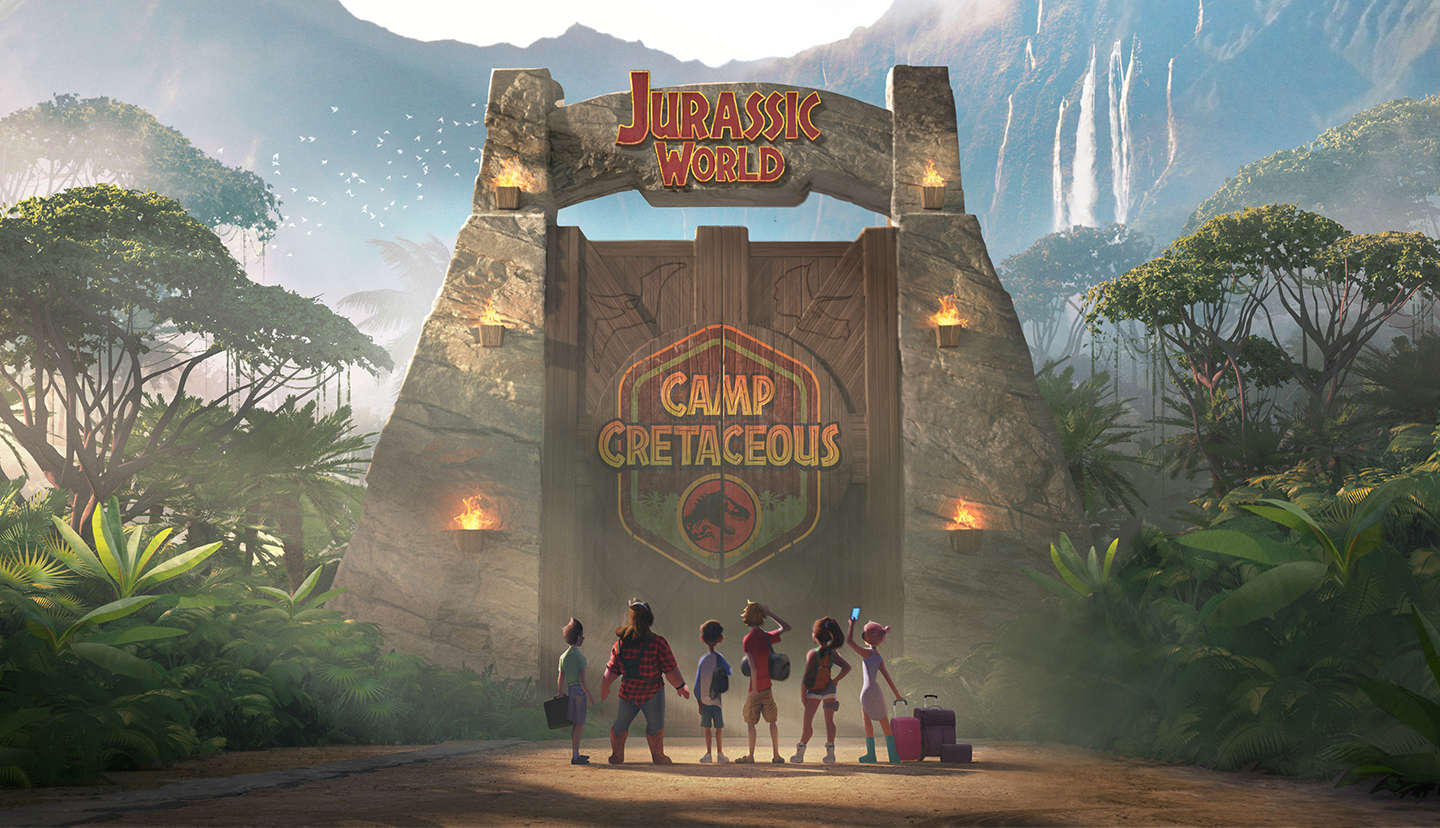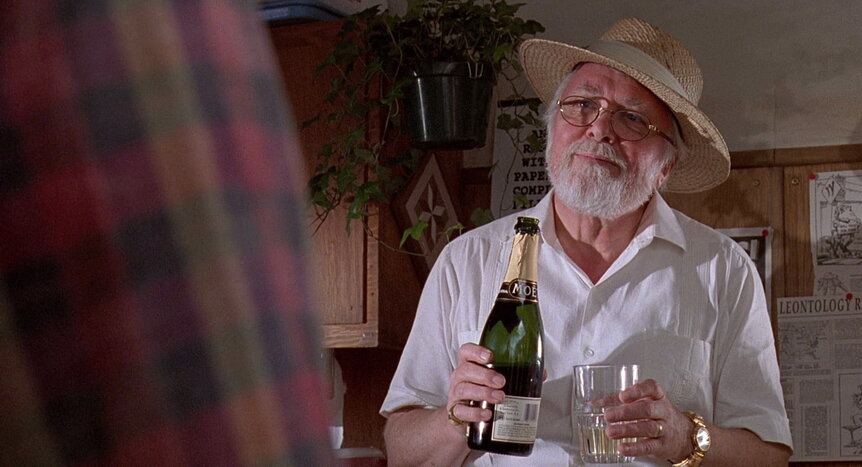Create a free profile to get unlimited access to exclusive videos, sweepstakes, and more!
Jurassic World: Camp Cretaceous finally lets the park be a failure of capitalism and greed

When Jurassic Park was re-released earlier this year, it quickly became the No. 1 film in America at drive-ins, as audiences re-connected with this cautionary tale about playing god and over-relying on automation and technology in an attempt to control nature. While “man versus nature” and the hubris of technology are common themes in both the Jurassic Park and Jurassic World franchises (and lots of other sci-fi films), there is one other warning that is the foundation of Michael Crichton's original novel. It is barely hinted at in the first film, and then almost totally forgotten afterward.
Here's the truth: Jurassic Park itself was already a failure of capitalism and greed even before the dinosaurs came into play. Thankfully, the franchise is finally free to explore these themes in the new Netflix animated show Jurassic World: Camp Cretaceous.
The show, which premiered on Netflix on Sept. 18, follows a group of teenagers who, for various reasons, are invited to an exclusive preview of Camp Cretaceous, a summer camp for kids on the same island that hosts the titular Jurassic World park. From the first episode, we get the impression that the camp, which puts kids in such close proximity to murderous dinosaurs, is not exactly well thought out. Despite Jurassic Park’s deadly history, we quickly realize that even the most basic of safety measures simply don't exist on Isla Nublar or the world of Jurassic World. WiFi and walkie talkies are glitchy, emergency brakes on really fast vehicles don't work, kids are left alone to explore dangerous animal enclosures, and there is no one in charge that seems aware of the six kids roaming around the island.
And this is what gives Camp Cretaceous a special place in the larger franchise. Sure, we know from the get-go that, eventually, the dinosaurs will get out and eat dozens of people. What we don't expect is for the park itself to become the biggest threat to the children's well-being.
From the beginning, we get the impression that no one really cares what the kids do. Mere hours after getting the classic "Welcome to Camp Cretaceous" greeting (complete with all the awe-struck dino fanfare) the kids are left alone to their own devices. The camp's employees, composed entirely of two unhelpful counselors who act like they were just fired from Friday the 13th’s Camp Crystal Lake, seem to be the only people at Jurassic World who even know that there are summer campers on the island.
In the first episode alone, two of the campers sneak out to what they think is a comfy enclosure but end up nearly getting mauled and devoured by velociraptors. As a punishment, the counselors leave the two kids behind on the side of the road while everyone else goes to visit the DNA labs. Again, these are kids, completely alone, on an island known for the various dinosaurs that have eaten people on multiple occasions. Why spend so much money opening a camp (which presumably won't be free) and invite the kids of various rich VIPs with ties to the park's owners, only to leave them unsupervised?
As if that weren't enough, the characters are constantly complaining about nothing in the park working when needed. Not the walkie-talkies (the only method for communication when escaping the murderous dinosaurs), not the WiFi or telephone lines that can contact the mainland, not even the emergency brakes on the park's monorail or on the zipline that the kids ride to get across sections of the park. It doesn't take long for the kids, and the audience, to realize the sham behind Jurassic Park founder John Hammond's mantra of "spared no expense." Sure, the dinosaurs are extremely real, and the park itself looks very luxurious and grand, but everything else is just in absolute disregard for the health and safety of the people working in and visiting the park.
This is far from the same park in Michael Crichton's original novel. Before Spielberg adapted the novel, Crichton imagined John Hammond as a greedy, evil businessman who cares not one iota about the safety of the park's guests. There is no doubt in the novel that the park's owner cut corners every chance he got, and his "spared no expense" is just a front he puts on for others. When speaking with Dr. Henry Wu in the novel, Hammond confesses he only cares about money, by explaining that if you make a miracle drug for cancer, it is not only your right, but almost your duty to charge however many thousands of dollars you want per dose. "But do you really think that the government will let you do that?" Hammond asks Wu. "No, Henry, they will not... From a business standpoint, that makes helping mankind a very risky business. Personally, I would never help mankind."
The message of the original Jurassic Park novel is still one of the dangers of playing god and messing with nature, but the film changed lanes to present a different reason why the park failed. In Spielberg's movie, the first time we hear of the great John Hammond, we hear that he can't be at a dig site to meet the lawyer who will assess whether the park can be insured so it can open, because he needs to be in New York with his daughter, who is getting divorced. He is a man who deeply cares about his children, his employees, and the future guests of his park. It doesn't help that Hammond is played by future Santa Claus actor Richard Attenborough. When the bloodsucking lawyer starts talking about the thousands of dollars they can charge for tickets to the park, the movie's Hammond instantly shuts him down and says he doesn't want the park to be just for the super-rich.
Even in Jurassic World, the park's new owner, Simon Masrani, is portrayed as a good billionaire who repeatedly says he doesn't care about profits, but about the safety of his guests. He even dies trying to bring down the Indominous Rex himself.
The true villain in the first Jurassic Park movie — and even in Jurassic World — is the over-reliance on technology and automation. The state-of-the-art Jeeps that take the park's guests on a tour, the security system that keeps all the dinosaurs safely locked up, the telephone lines, everything is connected to just a handful of computers. Everything in the park depends on every single system working at 100 percent capacity, and when a single thing goes wrong, everything collapses. In the original book, this is only part of the problem. It’s capitalism that led to this risky hubris in the first place, and Camp Cretaceous is well aware of the dangers of sticking capitalism’s invisible hand into a velociraptor enclosure.
Instead of reminding us of the dangers of relying too much on technology to do everything for us, Camp Cretaceous takes a page out of the original text to show that you don't need murderous dinosaurs eating the guests to ruin a park. All you need is a greedy businessman who is more interested in profits than real people, and people will suffer anyway.



























